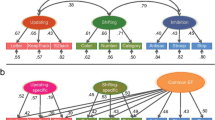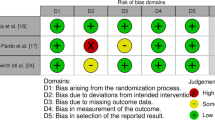Abstract
Background
CogMed Working Memory Training (CWMT) is a computer-based program shown to improve working memory (WM) among those with cognitive impairments. No study to date has investigated its feasibility, acceptability, and satisfaction in adult patients with glioma, despite the well-documented incidence of WM impairment in this population.
Methods
Twenty patients with glioma and objective and/or perceived WM deficits enrolled in the study: 52% high-grade, 60% female, Mage = 47 (range = 21–72 years). Adverse events were monitored to determine safety. Feasibility and acceptability were assessed based on established metrics. Satisfaction was explored by exit-interviews. Neurocognitive tests and psychological symptoms were analyzed at baseline and post-CWMT to estimate effect sizes.
Results
Of 20 enrolled patients, 16 completed the intervention (80% retention rate). Reasons for withdrawal included time burden (n = 2); tumor-related fatigue (n = 1) or loss to follow-up (n = 1). No adverse events were determined to be study-related. Adherence was 69% with reasons for nonadherence similar to those for study withdrawal. The perceived degree of benefit was only moderate. Baseline to post-CWMT assessments showed medium to large effects on neurocognitive tasks. Psychological symptoms remained stable throughout the study period.
Conclusions
CWMT was found to be safe and acceptable in adult patients with glioma. Enrollment, retention rates, and treatment adherence were all adequate and comparable to studies recruiting similar populations. Only moderate perceived benefit was reported despite demonstrated improvements in objectively-assessed WM. This may indicate that the time commitment and intervention intensity (5 weeks of 50-min training sessions on 5 days/week) outweighed the perceived benefits of the program. (Trial Registration Number: NCT03323450 registered on 10/27/2017).


Similar content being viewed by others
References
Tucha O, Smely C, Preier M, Lange KW (2000) Cognitive deficits before treatment among patients with brain tumors. Neurosurgery 47:324–333. https://doi.org/10.1097/00006123-200008000-00011 (discussion 333–334)
Zucchella C, Bartolo M, Di Lorenzo C et al (2013) Cognitive impairment in primary brain tumors outpatients: a prospective cross-sectional survey. J Neurooncol 112:455–460
Meyers CA, Hess KR, Yung WK, Levin VA (2000) Cognitive function as a predictor of survival in patients with recurrent malignant glioma. J Clin Oncol 18:646–650. https://doi.org/10.1200/jco.2000.18.3.646
Noll KR, Ziu M, Weinberg JS, Wefel JS (2016) Neurocognitive functioning in patients with glioma of the left and right temporal lobes. J Neurooncol 128:323–331. https://doi.org/10.1007/s11060-016-2114-0
McAleer MF, Brown PD (2015) Neurocognitive function following therapy for low-grade gliomas. Semin Radiat Oncol 25:210–218. https://doi.org/10.1016/j.semradonc.2015.02.005
Pendergrass C, Targum S, Harrison J (2018) Cognitive impairment associated with Cancer: A brief review. Innov Clin Neurosci 15:36–44
Teixidor P, Gatignol P, Leroy M et al (2007) Assessment of verbal working memory before and after surgery for low-grade glioma. J Neurooncol 81:305–313. https://doi.org/10.1007/s11060-006-9233-y
Gehrke AK, Baisley MC, Sonck ALB et al (2013) Neurocognitive deficits following primary brain tumor treatment: systematic review of a decade of comparative studies. J Neurooncol 115:135–142
Cowan N (2014) Working memory underpins cognitive development, learning, and education. Educ Psychol Rev 26:197–223
Groves NB, Kofler MJ, Wells EL et al (2020) An examination of relations among working memory, ADHD symptoms, and emotion regulation. J Abnorm Child Psychol 48:525–537. https://doi.org/10.1007/s10802-019-00612-8
Mlinac ME, Feng MC (2016) Assessment of activities of daily living, self-care, and independence. Arch Clin Neuropsychol 31:506–516. https://doi.org/10.1093/arclin/acw049
Schagen SB, Klein M, Reijneveld JC et al (2014) Monitoring and optimising cognitive function in cancer patients: present knowledge and future directions. Eur J Cancer Suppl 12:29–40. https://doi.org/10.1016/j.ejcsup.2014.03.003
Loughan AR, Braun SE, Lanoye A (2019) Executive dysfunction in neuro-oncology: behavior rating inventory of executive function in adult primary brain tumor patients. Appl Neuropsychol Adult. https://doi.org/10.1080/23279095.2018.1553175
Loughan AR, Allen DH, Baumstarck K et al (2018) Quality of life in neuro-oncology. Handb Brain Tumor Chemother Mol Ther Immunother. https://doi.org/10.1016/B978-0-12-812100-9.00061-9
Klingberg T, Fernell E, Olesen PJ et al (2005) Computerized training of working memory in children with ADHD - a randomized, controlled trial. J Am Acad Child Adolesc Psychiatry 44:177–186. https://doi.org/10.1097/00004583-200502000-00010
Björkdahl A, Åkerlund E, Svensson S, Esbjörnsson E (2013) A randomized study of computerized working memory training and effects on functioning in everyday life for patients with brain injury. Brain Inj 27:1658–1665. https://doi.org/10.3109/02699052.2013.830196
Hardy KK, Willard VW, Allen TM, Bonner MJ (2013) Working memory training in survivors of pediatric cancer: a randomized pilot study. Psychooncology 22:1856–1865. https://doi.org/10.1002/pon.3222
Raskin S (2011) Neuroplasticity and rehabilitation. Guilford Publications
Aksayli ND, Sala G, Gobet F (2019) The cognitive and academic benefits of Cogmed: a meta-analysis. Educ Res Rev 27:229–243
Sacks-Zimmerman A, Duggal D, Liberta T (2015) Cognitive remediation therapy for braintumor survivors with cognitive deficits. Cureus. https://doi.org/10.7759/cureus.350
Liberta TA, Kagiwada M, Ho K et al (2020) An investigation of COGMED working memory training for neurological surgery patients. Interdiscip Neurosurg Adv Tech Case Manag. https://doi.org/10.1016/j.inat.2020.100786
Poleon S, Szaflarski JP (2017) Targeted review photosensitivity in generalized epilepsies ☆. https://doi.org/10.1016/j.yebeh.2016.10.040
Vecht CJ, Kerkhof M, Duran-Pena A (2014) Seizure prognosis in brain tumors: new insights and evidence-based management. Oncologist 19:751–759. https://doi.org/10.1634/theoncologist.2014-0060
Boele FW, Zant M, Heine ECE et al (2014) The association between cognitive functioning and health-related quality of life in low-grade glioma patients. Neuro-oncology. https://doi.org/10.1093/nop/npu007
Habets EJJ, Kloet A, Walchenbach R et al (2014) Tumour and surgery effects on cognitive functioning in high-grade glioma patients. Acta Neurochir (Wien) 156:1451–1459. https://doi.org/10.1007/s00701-014-2115-8
Czajkowski SM, Powell LH, Adler N et al (2015) From ideas to efficacy: The ORBIT model for developing behavioral treatments for chronic diseases. Heal Psychol 34:971–982. https://doi.org/10.1037/hea0000161
Pearson (2009) Advanced Clinical Solutions for WAIS-IV and WMS-IV
Randolph C (2009) RBANS Update Repeatable Battery for the Assessment of Neuropsychological Status: Manual. Pearson
Roth RM, Isquith PM, Giola GA (2005) BRIEF—A: behavior rating inventory of executive function— adult version. Psychological Assessment Resources, Lutz, FL
Richard NM, Bernstein LJ, Mason WP et al (2019) Cognitive rehabilitation for executive dysfunction in brain tumor patients: a pilot randomized controlled trial. J Neurooncol 142:565–575. https://doi.org/10.1007/s11060-019-03130-1
Peterson AL, Roache JD, Raj J, Young-McCaughan S (2013) The need for expanded monitoring of adverse events in behavioral health clinical trials. Contemp Clin Trials. https://doi.org/10.1016/j.cct.2012.10.009
Lancaster GA, Dodd S, Williamson PR (2004) Design and analysis of pilot studies: recommendations for good practice. J Eval Clin Pract 10:307–312. https://doi.org/10.1111/j.2002.384.doc.x
Leon AC, Davis LL, Kraemer HC (2011) The role and interpretation of pilot studies in clinical research. J Psychiatr Res 45:626–629. https://doi.org/10.1016/j.jpsychires.2010.10.008
Vranceanu A-M, Jacobs C, Lin A et al (2019) Results of a feasibility randomized controlled trial (RCT) of the Toolkit for Optimal Recovery (TOR): a live video program to prevent chronic pain in at-risk adults with orthopedic injuries. Pilot feasibility Stud 5:30. https://doi.org/10.1186/s40814-019-0416-7
Hassler MR, Elandt K, Preusser M et al (2010) Neurocognitive training in patients with high-grade glioma: a pilot study. J Neurooncol 97:109–115. https://doi.org/10.1007/s11060-009-0006-2
Gehring K, Sitskoorn MM, Gundy CM et al (2009) Cognitive rehabilitation in patients with gliomas: a randomized, controlled trial. J Clin Oncol 27:3712–3722. https://doi.org/10.1200/JCO.2008.20.5765
Lonkhuizen PJC, Klaver KM, Wefel JS et al (2019) Interventions for cognitive problems in adults with brain cancer: a narrative review. Eur J Cancer Care (Engl). https://doi.org/10.1111/ecc.13088
Agar M, Koh ES, Gibbs E et al (2016) Validating self-report and proxy reports of the Dexamethasone Symptom Questionnaire -Chronic for the evaluation of longer-term corticosteroid toxicity. Support Care Cancer. https://doi.org/10.1007/s00520-015-2897-0
Cantisano N, Menei P, Roualdes V et al (2020) Patient-reported functional executive challenges and caregiver confirmation in adult brain tumor survivors. J Cancer Surviv. https://doi.org/10.1007/s11764-020-00961-0
van der Linden SD, Gehring K, De Baene W et al (2020) Assessment of executive functioning in patients with meningioma and low-grade glioma: a comparison of self-report, proxy-report, and test performance. J Int Neuropsychol Soc. https://doi.org/10.1017/S1355617719001164
Duff K, Schoenberg MR, Mold JW et al (2007) Normative and retest data on the RBANS cortical/subcortical index in older adults. J Clin Exp Neuropsychol. https://doi.org/10.1080/13803390601147629
Krogh Rasmussen B, Hansen S, Laursen RJ et al (2017) Epidemiology of glioma: clinical characteristics, symptoms, and predictors of glioma patients grade I-IV in the the Danish Neuro-Oncology Registry. J Neurooncol 135:571–579. https://doi.org/10.1007/s11060-017-2607-5
Sattler J, Ryan J (2009) Assessment with the WAIS-IV
Drozdick L, Holdnack J, Hilsabeck R (2011) Essentials of WMS-IV assessment
Heaton RK, Miller S, Taylor M, Grant I (2004) Revised comprehensive norms for an expanded Halstead-Reitan Battery: Demographically adjusted neuropsychological norms for African American and Caucasian adults scoring programs
Kroenke K, Spitzer RL, Williams JBW (2001) The PHQ-9. J Gen Intern Med 16:605–613. https://doi.org/10.1046/j.1525-1497.2001.016009606.x
Spitzer RL, Kroenke K, Williams JBW, Löwe B (2006) A brief measure for assessing generalized anxiety disorder. Arch Intern Med 166:1092. https://doi.org/10.1001/archinte.166.10.1092
Beck AT, Steer RA, Brown GK (1996) BDI-II, Beck depression inventory : manual, Second edition
Wilson KA, de Beurs E, Palmer CA, Chambless DL (1999) Beck Anxiety Inventory. In: Maruish ME (ed) The use of psychological testing for treatment planning and outcomes assessment. Lawrence Erlbaum Associates Publishers, Mahwah, NJ, US
Beck AT, Steer RA, Brown GK (1996) Manual for the beck depression inventory-second edition. The Psychological Corporation, San Antonio, TX
Beck AT, Steer RA (1993) BAI, Beck anxiety inventory: manual, 1993rd edn. Psychological Corporation, San Antonio
Acknowledgements
Thank you to all of our patients. We would also like to thank our research assistants Kelcie Willis and Julia Brechbiel for their contributions to this project.
Funding
VCU School of Medicine Deans Academic Enhancement Award. The project described was also supported by CTSA award No. KL2TR002648 from the National Center for Advancing Translational Sciences. Its contents are solely the responsibility of the authors and do not necessarily represent the official views of the National Institutes of Health.
Author information
Authors and Affiliations
Contributions
Conceptualization: SB, PhD, FA, MS, AL, PhD, AL, PhD; Methodology: SB, PhD, AL, PhD; Formal analysis and investigation: SB, PhD, FA, MS, AL, PhD, SF-Z, PhD; Writing – original draft preparation: SB, PhD, FA, MS; Writing – review and editing: SB, PhD, FA, MS, AL, PhD, SF-Z, PhD, MM, MD, AL, PhD; Funding acquisition: AL, PhD, MM, MD; Resources: AL, PhD, MM, PhD; Supervision: AL, PhD, SB, PhD, MM, PhD.
Corresponding author
Ethics declarations
Conflict of interest
The authors have no conflict of interests to disclose.
Data availability
The datasets generated during and/or analysed during the current study are available from the corresponding author on reasonable request.
Ethical approval
Approval was obtained from the ethics committee of Virginia Commonwealth University and Massey Cancer Center. The procedures used in this study adhere to the tenets of the Declaration of Helsinki.
Consent to participate
Informed consent was obtained from all individual participants included in the study.
Additional information
Publisher's Note
Springer Nature remains neutral with regard to jurisdictional claims in published maps and institutional affiliations.
Supplementary Information
Below is the link to the electronic supplementary material.
Rights and permissions
About this article
Cite this article
Braun, S.E., Aslanzadeh, F.J., Lanoye, A. et al. Working memory training for adult glioma patients: a proof-of-concept study. J Neurooncol 155, 25–34 (2021). https://doi.org/10.1007/s11060-021-03839-y
Received:
Accepted:
Published:
Issue Date:
DOI: https://doi.org/10.1007/s11060-021-03839-y




